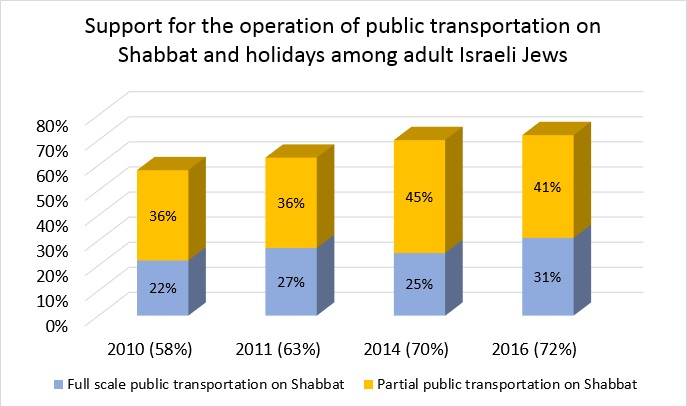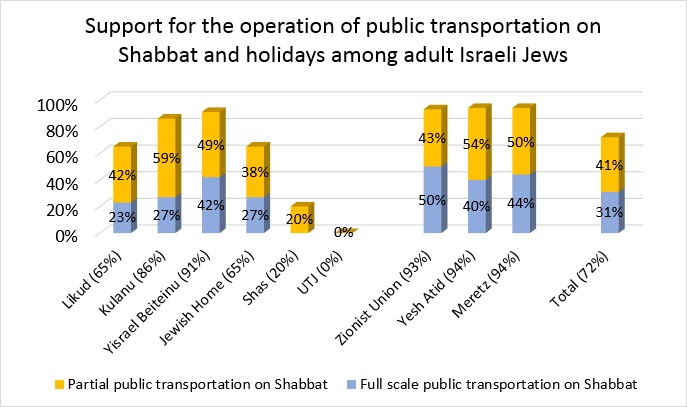52% of Zionist Orthodox Israeli Jews support public transportation on Shabbat
72% Jewish Israelis support public transportation on Shabbat
The gap between the public's support for public transportation on Shabbat and the cowardly, embarrassing intransigence of the Coalition is intolerable. MK Yael German (Yesh Atid): "A minority faction in the Knesset prevents such measures for social justice."
19/06/2016 10:24
Tags: transportation · Yael German · Shabbat
Throughout most of Israel, there is no public transportation on the Sabbath. This is a result of demands made by the religious Orthodox parties who have been members of Israel’s coalition governments for most of Israel’s history. Today, PM Netanyahu's Cabinet once again discussed this policy, as a result of MK Yael German's (Yesh Atid) proposed bill to allow local authorities to determine whether or not to operate public transportation in their respective municipalities. Predictably, the Cabinet rejected MK German's proposal.

72% of the Jewish public supports the availability of full scale or partial public transportation on Shabbat and holidays. 41% support the operation of public transportation on "limited, central bus lines, and on a smaller scale, perhaps in service taxi vans." 31% support the operation of "public transportation on a full-scale, just as it is available during the week." 52% of Zionist Orthodox Israeli Jews support this, and of these 49% support partial public transportation on Shabbat and holidays, while 3% support this on a full scale.
This survey was conducted by the Smith Polling Institute for Hiddush – Freedom of Religion for Israel on June 15. It was conducted by telephone among a representative population sample of 500 people from Israel's adult Jewish population. Hiddush is publishing these results on the day of the Knesset deliberations on the transportation bill, proposed by MK Yael German (Yesh Atid party). The bill would empower local authorities to make decisions for their municipalities about the availability of public transportation on Shabbat. This survey was conducted with generous support from IREP - the Israel Religious Expression Platform.
Hiddush has included this question annually in its Israel Religion & State Index, which is published every year on the Eve of Rosh Hashanah. Since the inception of Hiddush's annual Religion & State Index, there has been a consistent increase in public support for the operation of public transportation on Shabbat, from 58% support in 2010, to 63% in 2011, to 70% in 2014, and as high as 72% in the 2015 Religion & State Index, as well as 72% in this latest survey.
SURVEY DETAILS
As noted, 72% of the Jewish Israeli public support some form of public transportation on Shabbat: 41% partial, and 31% full scale. However, 28% are opposed to operating public transportation on Shabbat and holidays, of which 19% favor the current situation (with almost no public transportation available on Shabbat), and 9% support doing away with the limited transportation that is currently available.
94% of secular Jews support the operation of public transportation on Shabbat, as do 67% of traditional Jews. Particularly interesting: 52% of Zionist Orthodox Jews support support this initiative (49% support partial, and 3% support full scale). 97% of ultra-Orthodox Jews oppose public transportation on Shabbat, of which 55% favor doing away with the limited public transportation on Shabbat, which is available in Israel today.

Among voters for the coalition parties, support for operating public transportation on Shabbat on a partial or full scale is high: 65% of Likud voters, Kulanu - 86%, Yisrael Beiteinu - 91%, Jewish Home - 65%. Voters for the opposition parties support public transportation on Shabbat as well: The Zionist Union - 93%, Yesh Atid - 94%, Meretz - 94%. Only a majority of the Haredi political parties' voters oppose this initiative: 80% of Shas and 100% of United Torah Judaism voters are opposed.
MK Yael German (Yesh Atid): Support grows every year
There is an intolerable gap between the public's support for the operation of public transportation on Shabbat, including the support of voters for the Government Coalition parties, and the obstinate, criminal indifference of the Coalition. Despite the tremendous level of public support, and despite the public's vital need, the Ministry of Transportation does not allow it.
There is an intolerable gap between the public's support for the operation of public transportation on Shabbat, including the support of voters for the Government Coalition parties, and the obstinate, criminal indifference of the Coalition.
It is difficult to think of a bill more fair and reasonable than MK German's proposal. The decision as to whether or not to operate public transportation on Shabbat would be turned over to local residents; and public transportation would only be operated on particular central bus lines, and only in a limited capacity. There is no reasonable excuse for rejecting this proposal, other than kowtowing to the ultra-Orthodox parties' political coercion and bullying. This is exactly the kind of coercion that makes the ultra-Orthodox parties and the Chief Rabbinate Judaism's greatest enemies, and leads the general public to hate the Jewish tradition.
Further, There a few social justice causes more justified than the operation of public transportation on Shabbat. Those who suffer the most under the current political reality are Israel's most vulnerable: those with special needs, the elderly, the young and soldiers who do not have vehicles or cannot drive. Even worse, it is also a matter of life and death: the lack of public transportation on Shabbat requires young soldiers on leave to drive when they go out to drink with their friends, and consequently increases the risk of road accidents and harm. However, the elderly, the poor and the young of the secular and traditional populations are invisible to the ultra-Orthodox politicians. They are only concerned with their ultra-Orthodox religious preferences.
MK Yael German (Yesh Atid) who proposed the bill responded to Hiddush's survey: "This proves once again that most of the Israeli public is interested in having public transportation available on Shabbat. Support increases every year, and it crosses party lines, including the Zionist Orthodox Jewish Home party's voters. Again, we find that a minority of Knesset politicians, only 5% of its members, prevents a law from passing, which would bring social justice to those populations who cannot drive or do not have cars, improving quality of life standards for all Israelis."